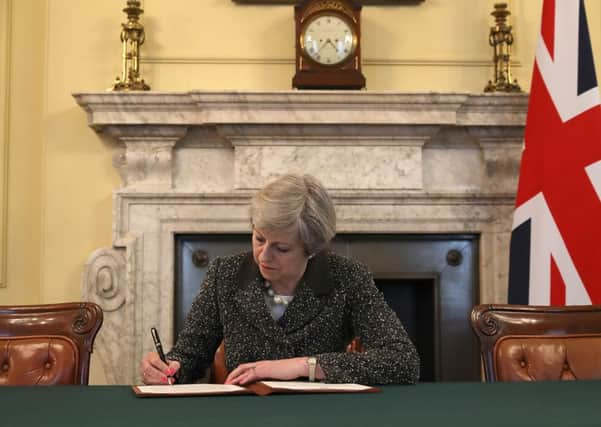Euan McColm: Proof that breaking up is so very hard to do


But undermining whatever the former First Minister might have claimed about the looming negotiations with the remaining parts of the UK would have been the fact that Scotland had just told England, Wales, and Northern Ireland (but mostly England) to get stuffed.
It would have been ludicrous for Salmond to try to characterise the process of dismantling the UK as something that would breeze along on a gust of bonhomie. But, of course, he would have done so. How could he have done anything else?
Advertisement
Hide AdAdvertisement
Hide AdSalmond’s speech would have been, in many parts, identical to the one delivered by Prime Minister Theresa May after she sent the EU a letter last week outlining the UK’s intention to leave.
May – a Remainer, remember – was light on detail and heavy on hand-of-friendship platitudes. Brexit presented great opportunities, she said, adding that she sought a new partnership in the best interests of both the UK and the EU.
The Prime Minister’s speech was carefully crafted to avoid prolonged contact with reality. In her vision, our former partners in Europe will take our rejection in their stride and, setting aside matters of political fact, perform whatever contortions are required to ensure Brexit works for the UK.
How the Brexit agreement to come will fully satisfy the interests of both parties is not at all clear. The remaining members of the EU – we’re calling them the EU27, now – hold all the cards. And the impact on the UK of Brexit, this self-inflicted wound, is far from the priority for those who remain part of the European club.
As her letter winged its way to the EU, May said that she wanted talks over the UK’s withdrawal and talks over a future trade deal to take place in tandem. This, it would seem evident, would certainly be in the best interests of Britain. Anything that might make the Brexit process less painful than it has to be (and it has to be very, very painful) is to be welcomed.
But it did not take long for the European Council President, Donald Tusk, to put paid to the notion a sweet trade deal might be easily stitched up. He made clear that the UK must make progress on the terms of its departure from the EU before any talks on future trade terms can begin.
The Prime Minister would have us believe that so important is the UK to the rest of the EU that we will enjoy a uniquely privileged position during negotiations over our departure. But reality is about to smash into that fanciful idea.
Across the continent, there are political parties that make departure from the EU a priority; Ukip is not alone in repeating the mantra that voters should take back control. As the UK negotiates its departure from the Union, our former partners will be keen to show other secessionists that a break with Europe comes at a cost.
Advertisement
Hide AdAdvertisement
Hide AdSure, Brexiteers will insist that the UK can all but dictate terms, but the EU27 will want to ensure that our departure is seen to come at a cost. Pour encourager les autres and all that.
Without question, the most extraordinary part of the Prime Minister’s letter to our European neighbours was the suggestion that failure to reach agreement over Brexit would mean that cooperation between the UK and the EU in the fight against crime and terrorism would be weakened.
It was difficult to disagree with Liberal Democrat leader Tim Farron’s take that this was a “blatant threat” to European negotiators.
It was a foolish thing for May to have written and we should hope that she swiftly ditches this particular line of “persuasion”. Even the most zealous Brexiteer wouldn’t argue that the withholding of vital information on matters of terrorism is a viable way to go.
The Prime Minister heads towards Brexit negotiations believing that the process she is about to facilitate is bad for the UK. What a remarkable state of affairs this is.
As negotiations get under way, May will struggle to maintain the lie that Brexit will mark a bright new dawn. Our soon to be former colleagues in Europe will see to it that the UK’s decision to walk away from more than four decades of political co-operation is seen to come with a price tag.
Watching all of this very closely is the SNP, which is about to bet the farm on a second referendum on Scottish independence. The Nats want Scots to be so furious about Brexit that we will change our minds about the break-up of the UK, but it may be that the experience of negotiations with the EU makes the prospect of even further political and social disentanglement less appealing than it once was.
The SNP narrative remains that the break-up of the UK would not only be a straightforward process but that it would unlock currently suppressed potential both north and south of the border. Brexit is about to show what happens when a political union is broken and it is not going to be a walk in the park.
Advertisement
Hide AdAdvertisement
Hide AdThe idea that the EU27 will make life as easy as possible for the UK in the months ahead is certainly a lovely one but it’s also a piece of nonsense.
By the time talks are complete and the UK has “taken back control”, even Brexiteers might wonder if the losses incurred by our departure from the EU are a price worth paying for our “freedom”.